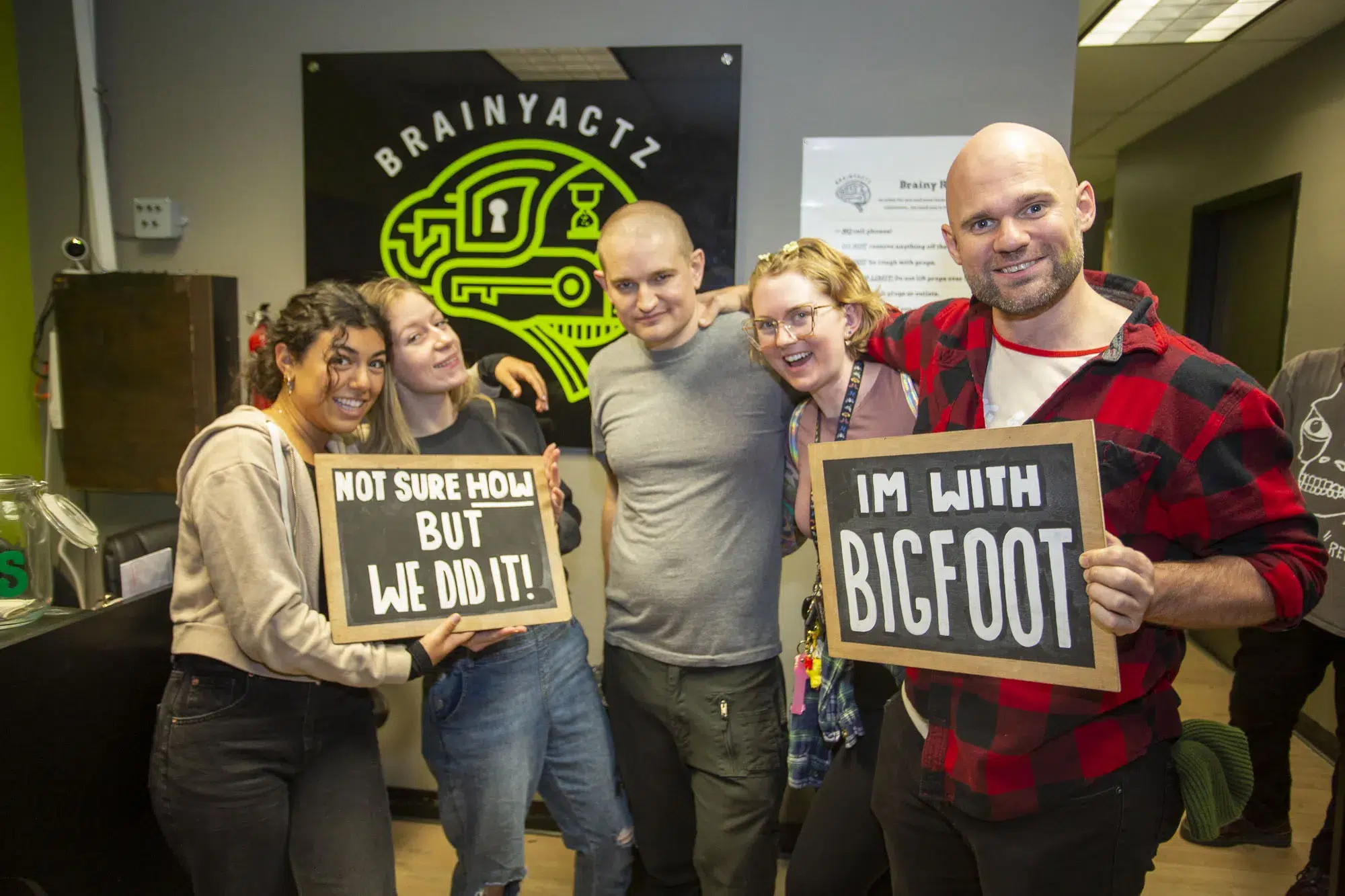Escape rooms have taken the world by storm, offering an immersive and interactive experience that is perfect for groups seeking a fun and engaging activity. Unlike traditional forms of entertainment, escape rooms challenge players to think critically, collaborate, and solve puzzles within a set time frame. These interactive adventures test problem-solving skills, foster teamwork, and give participants an adrenaline-pumping experience that leaves a lasting impression. Whether you want to bond with friends, strengthen workplace dynamics, or enjoy an exciting challenge, an interactive escape room offers the ultimate group experience.
In this comprehensive guide, we’ll explore everything you need to know about interactive escape rooms, including why they’re such a hit, how to plan the perfect outing, and what to expect during the experience. Get ready to discover how escape rooms have become the go-to activity for groups looking to connect, have fun, and test their wits!
Key Takeaways:
- Teamwork is crucial – Escape rooms require collaboration to solve puzzles and succeed.
- Puzzles challenge creativity – Participants face brain-teasers that enhance problem-solving skills.
- Immersive environments – Themed settings transport players into captivating, story-driven experiences.
- Perfect for group bonding – Escape rooms strengthen relationships among friends, families, and coworkers.
- Ideal for team building – Escape rooms enhance communication, trust, and collaboration in workplace settings.
Why Escape Rooms Are Perfect for Group Experiences

Escape rooms are uniquely suited for groups because they encourage collaboration, communication, and problem-solving in a dynamic and fast-paced environment. Here are some of the key reasons why escape rooms have gained popularity as the ultimate group activity:
1. Teamwork and Collaboration
At the heart of every successful escape room experience is teamwork. Escape rooms are designed to require group members to work together in order to solve complex puzzles and escape within the time limit. Each player contributes their unique skills and perspectives, whether it’s deciphering codes, finding hidden objects, or figuring out how different clues fit together. This collaborative element strengthens bonds among group members, whether they’re friends, family, or coworkers.
2. Problem-Solving in Action
Escape rooms are packed with challenging puzzles that test players’ logic, creativity, and analytical thinking. Groups are often tasked with solving a variety of riddles, uncovering clues, and figuring out how to use different items in the room to progress through the game. This type of mental engagement encourages out-of-the-box thinking and allows group members to rely on one another’s strengths to find solutions.
3. Communication is Key
Escape rooms force players to communicate efficiently and clearly. Whether it’s sharing a clue, explaining a strategy, or assigning roles, communication is critical to success. Group members learn to listen actively and share their ideas, which often leads to breakthroughs. Effective communication can make the difference between escaping the room in time or getting stuck on a particularly tricky puzzle.
4. Shared Excitement and Fun
One of the most rewarding aspects of escape rooms is the shared sense of accomplishment that comes with solving puzzles and completing the game. Groups experience the thrill of working together toward a common goal, and the excitement builds as the clock ticks down. The immersive nature of escape rooms, combined with their focus on teamwork, makes the entire experience memorable and fun for everyone involved.
Planning the Perfect Interactive Escape Room Experience

Planning an escape room outing for your group doesn’t have to be complicated. With a bit of preparation and organization, you can ensure that your group has an unforgettable experience. Here’s a step-by-step guide to planning the perfect escape room event:
Step 1: Choose the Right Escape Room
The first step in planning your escape room experience is to choose the right room for your group. Escape rooms come in a variety of themes and difficulty levels, so it’s important to select one that matches the preferences and skill levels of your group members.
Consider the Theme
Escape rooms often come with unique themes, from thrilling heists to haunted houses, futuristic worlds, and ancient tombs. Think about your group’s interests when selecting a theme—whether they enjoy mystery, adventure, or horror, there’s a room that will captivate them.
Assess the Difficulty Level
Escape rooms range from beginner-friendly to expert-level challenges. Make sure to choose a difficulty level that suits your group’s experience. For first-timers, it’s best to start with an easier room that allows everyone to get comfortable with the mechanics of the game. If your group is more experienced, feel free to opt for a more challenging room.
Step 2: Determine Group Size
The size of your group can impact the overall experience, so it’s important to choose a room that accommodates your team comfortably. Most escape rooms are designed for groups of 4-8 people, but some venues offer larger rooms for groups of 10 or more. Having the right group size ensures that everyone has an active role in solving puzzles, without the room feeling overcrowded or too empty.
Ideal Group Dynamics
When assembling your group, consider the dynamic of the participants. A mix of logical thinkers, creative problem-solvers, and enthusiastic players will lead to a more balanced and effective team. It’s also helpful to have players who are comfortable with communication and teamwork, as these qualities are essential to success in an escape room.
Step 3: Book in Advance
Escape rooms are popular, especially on weekends and holidays, so it’s a good idea to book your experience in advance. Many escape room venues offer online booking, where you can choose your preferred date, time, and room theme. Booking early ensures that you secure a spot that works best for your group’s schedule.
What to Expect During Your Escape Room Adventure

Once you’ve planned and booked your escape room experience, it’s time to get ready for the big day! Here’s what you can expect when you arrive at the escape room venue and during the game itself:
Arrival and Briefing
When your group arrives at the escape room venue, you’ll typically be greeted by a staff member who will explain the rules of the game. This briefing will cover the basics, such as the time limit (usually 60 minutes), how to handle clues and props, and what to do if you need assistance during the game. The game master may also give a brief introduction to the storyline or theme of the room to set the stage for the experience.
Immersive Environment
Once the briefing is over, you’ll be escorted into the escape room itself. Escape rooms are designed to be fully immersive, with detailed decorations, props, and sound effects that align with the room’s theme. Whether you’re stepping into a detective’s office or an ancient temple, the environment will transport you to another world, heightening the sense of adventure.
The Countdown Begins
As soon as the door closes behind you, the clock starts ticking! Your group will have a set amount of time—usually 60 minutes—to solve all the puzzles and escape the room. The pressure is on, but don’t panic. The best strategy is to stay calm, work together, and tackle one puzzle at a time.
Puzzle Solving and Clue Hunting
Escape rooms are filled with a variety of puzzles that require different types of thinking to solve. Some puzzles may involve physical objects, such as unlocking a box with a hidden key, while others might require decoding a message or solving a riddle. Your group will need to search the room for clues and piece together information to advance. It’s essential to divide tasks, share discoveries, and keep communicating throughout the game.
Assistance from the Game Master
If your group gets stuck on a particularly difficult puzzle, don’t worry—help is available! Most escape rooms allow you to request hints from the game master, who monitors the game from outside the room. The game master can offer subtle clues that guide you in the right direction without giving away the solution entirely. While it’s best to avoid relying too heavily on hints, they can be helpful if you’re running out of time.
The Endgame: Escaping (or Not) and Post-Game Debrief

As the time ticks down, the excitement and urgency in the room will build. Whether you manage to escape before the clock runs out or not, the experience will be thrilling and full of memorable moments.
Celebrating Your Success (or Learning from Failure)
If your group successfully escapes the room, celebrate! Completing an escape room within the time limit is a huge accomplishment and a testament to your group’s teamwork and problem-solving skills. Many escape room venues offer a post-game photo opportunity, where your group can pose with signs or props that commemorate your victory.
If you don’t manage to escape in time, don’t worry—escape rooms are challenging by design, and even seasoned players don’t always make it out. The important thing is to reflect on what worked well, what could have been done differently, and to enjoy the experience for what it was—a fun and engaging challenge.
Post-Game Debrief
After the game, the game master will usually provide a debrief, walking you through any puzzles you didn’t solve and explaining how the clues fit together. This debrief is a great opportunity to ask questions and gain insight into how you could improve your approach for future escape room adventures.
Why Escape Rooms Are Perfect for Team Building

Interactive escape rooms are more than just fun—they’re an excellent team-building tool. Many companies and organizations have started using escape rooms as a way to improve communication, collaboration, and problem-solving among employees. Here’s why escape rooms are ideal for team-building exercises:
Encouraging Collaboration
Escape rooms naturally encourage teamwork. In order to escape, participants must work together, communicate effectively, and pool their resources. This level of collaboration can strengthen relationships between colleagues and improve their ability to work together in a professional setting.
Identifying Strengths and Roles
In an escape room, different people’s strengths shine through. Some participants may excel at logic puzzles, while others might be skilled at finding hidden clues or thinking creatively. Identifying these strengths helps team members understand each other’s abilities and learn how to delegate tasks more effectively in the workplace.
Building Trust
Escape rooms create a pressure-filled environment where teams must rely on one another to succeed. This reliance fosters trust, as participants learn to support and depend on their teammates. Building this level of trust in a fun, low-stakes environment can translate into stronger working relationships.
Conclusion:
Interactive escape rooms offer the perfect blend of fun, challenge, and collaboration, making them the ultimate group experience. Whether you’re looking to bond with friends, celebrate a special occasion, or organize a team-building activity for your workplace, escape rooms provide an immersive and unforgettable adventure.
By planning the right escape room experience, selecting a theme that excites your group, and embracing the teamwork and problem-solving required to succeed, you can turn an ordinary outing into a thrilling, adrenaline-pumping event that will be talked about long after the door is unlocked.
So gather your group, book an escape room, and get ready for an interactive adventure that will challenge your minds, bring you closer together, and leave you wanting more.

